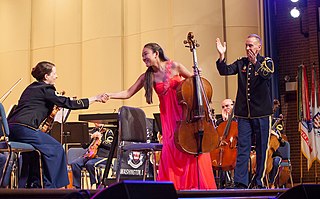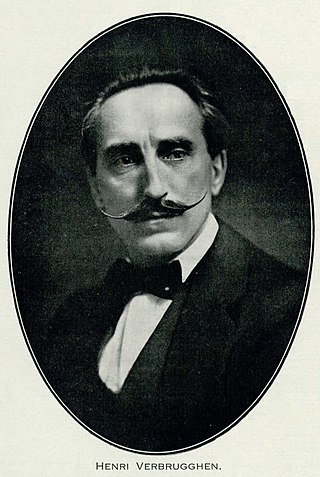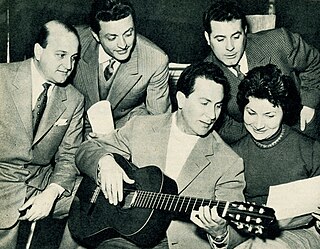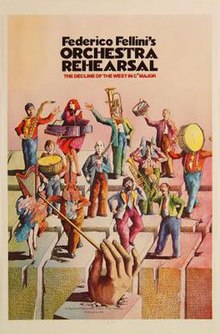
An orchestra is a large instrumental ensemble typical of classical music, which combines instruments from different families. There are typically four main sections of instruments:

Giovanni Rota Rinaldi, better known as Nino Rota, was an Italian composer, pianist, conductor and academic who is best known for his film scores, notably for the films of Federico Fellini and Luchino Visconti. He also composed the music for two of Franco Zeffirelli's Shakespeare screen adaptations, and for the first two installments of Francis Ford Coppola's The Godfather trilogy, earning the Academy Award for Best Original Score for The Godfather Part II (1974).

Claudio Abbado was an Italian conductor who was one of the leading conductors of his generation. He served as music director of the La Scala opera house in Milan, principal conductor of the Berlin Philharmonic, principal conductor of the London Symphony Orchestra, principal guest conductor of the Chicago Symphony Orchestra, music director of the Vienna State Opera, founder and director of the Lucerne Festival Orchestra, founder and director of the Mahler Chamber Orchestra, founding Artistic Director of the Orchestra Mozart and music director of the European Union Youth Orchestra.

Maestro is an honorific title of respect, sometimes abbreviated Mo. The term is most commonly used in the context of Western classical music and opera, in line with the ubiquitous use of Italian musical terms.

The concertmaster, first chair (U.S.) or leader (U.K.) is the principal first violin player in an orchestra. After the conductor, the concertmaster is the second-most significant leader in an orchestra, symphonic band or other musical ensemble.

Salvatore Accardo is an Italian violinist and conductor, who is known for his interpretations of the works of Niccolò Paganini.

A rehearsal is an activity in the performing arts that occurs as preparation for a performance in music, theatre, dance and related arts, such as opera, musical theatre and film production. It is undertaken as a form of practising, to ensure that all details of the subsequent performance are adequately prepared and coordinated. The term rehearsal typically refers to ensemble activities undertaken by a group of people. For example, when a musician is preparing a piano concerto in their music studio, this is called practising, but when they practice it with an orchestra, this is called a rehearsal. The music rehearsal takes place in a music rehearsal space.

The Portland Youth Philharmonic (PYP) is the oldest youth orchestra in the United States, established in 1924 as the Portland Junior Symphony (PJS). Now based in Portland, Oregon, the orchestra's origin dates back to 1910, when music teacher Mary V. Dodge began playing music for local children in Burns, Oregon. Dodge purchased instruments for the children and organized the orchestra, which would become known as the Sagebrush Symphony Orchestra. After touring the state, including a performance at the Oregon State Fair in Salem, the orchestra disbanded in 1918 when Dodge moved to Portland. There, Dodge opened a violin school and became music director of the Irvington School Orchestra.

Franco Ferrara was an Italian conductor and teacher. Among his many students are various prominent conductors, including Roberto Abbado, Riccardo Chailly, Andrew Davis and Riccardo Muti.

Henri Adrien Marie Verbrugghen was a Belgian musician, who directed orchestras in England, Scotland, Australia and the United States.

From Mao to Mozart: Isaac Stern in China is a 1979 documentary film about Western culture breaking into China produced and directed by Murray Lerner. It portrays the famous violinist and music teacher Isaac Stern as the first American musician to collaborate with the China Central Symphony Society.

The Orquesta Sinfónica de Madrid, founded in 1903, is a Spanish symphony orchestra. Since 1998, is the principal orchestra of the Teatro Real.

The 32nd Cannes Film Festival was held from 10 to 24 May 1979. The Palme d'Or went to Apocalypse Now by Francis Ford Coppola, which was screened as a work in progress, and Die Blechtrommel by Volker Schlöndorff.

Marzio Conti is an Italian conductor and flautist.

Below is a selected discography for Nino Rota (1911–1979). He was a prolific composer; there are a great many recordings of all of his music—both popular and classical; and it would be impossible to list all of them. Indeed, there are new performances and recordings of Rota's music being made to this day.

Carlo Savina was an Italian composer and conductor who composed, arranged, and conducted music for films, and is especially remembered for being the music director of films such as The Godfather (1972), Amarcord (1973), and The Bear (1988).

Fresco is an orchestral composition written in 1969 by the German composer Karlheinz Stockhausen as foyer music for an evening-long retrospective programme of his music presented simultaneously in three auditoriums of the Beethovenhalle in Bonn. It is Nr. 29 in his catalogue of works, and a performance takes about five hours.
The Concerto per Trombone e Orchestra in C was composed by Italian composer Nino Rota in 1966. The concerto is in three movements:
- Allegro giusto
- Lento, ben ritmato
- Allegro moderato
The Cabrillo Festival of Contemporary Music is an annual Festival dedicated to contemporary symphonic music by living composers. The music director since 2017 has been Cristian Măcelaru. According to Jesse Rosen, CEO of the League of American Orchestras, the Festival is "distinctive for being focused entirely on contemporary works." Each year, a tenured orchestra gathers in Santa Cruz, California to rehearse five programs of contemporary music, often world, US, or West Coast premieres. Most of the composers whose work is performed each season come to the Festival to be in residence and participate in the rehearsals and performances of their work, as well as to participate in public panel discussions, lectures, and concert introductions. The Festival also presents guest artists and ensembles known for contemporary music performance, such as Kronos Quartet or eighth blackbird.

Zoltán Peskó was a Hungarian conductor and composer who held leading positions at German, Italian and Portuguese opera houses and orchestras, including the Deutsche Oper Berlin, Teatro Comunale di Bologna, La Fenice, and Teatro Nacional de São Carlos. He was a regular conductor at La Scala, where he promoted contemporary opera.


















